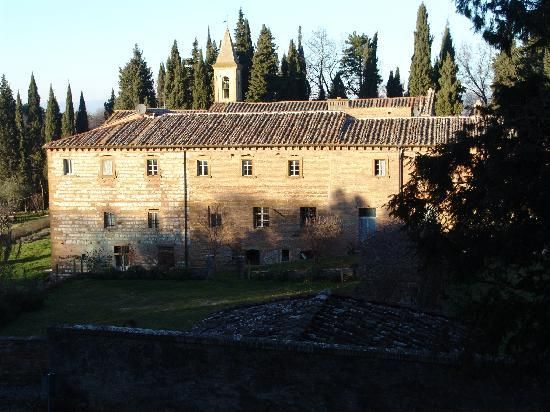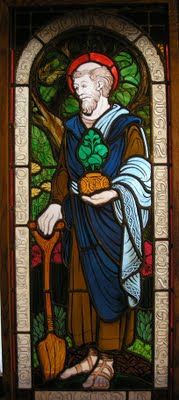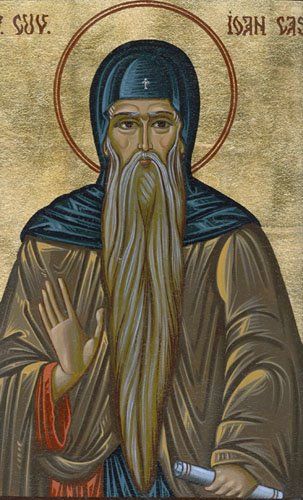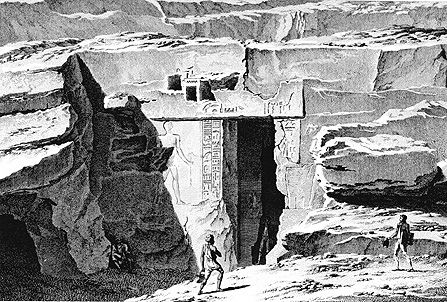Today, March 27, we celebrate the feast of
Saint John of Egypt (also known as Saint John of Lycopolis, 304-394), hermit and clairvoyant. The holy and austere life of Saint John was recorded and admired by
Saint Jerome,
Saint Augustine, Saint Cassia, and Saint Palladius. Through his creation of solitude in his life, Saint John found peace and extraordinary gifts of the Holy Spirit in his contemplation, prayer, and sacrifice.
Saint John was born in Lycopolis, (modern-day Assiut) Egypt, and worked as a carpenter with his father until he was twenty-five years of age. At that time, he experienced a profound call from the Lord, which led him to seek solitude in the desert, becoming a hermit. He desired nothing more than to be alone with God, leaving the world for good, and spending his life in prayer and sacrifice for God.
John found a teacher-- an elderly, seasoned hermit—with whom he studied and lived for ten years until the master’s death. From him, he learned holiness and dedication, and shook off the chains of temper and impatience that had weighed him down as a child and young adult. His master tested him with many unreasonable commands, ordering him to roll hard rocks, tend dead trees, and other equally difficult pursuits. John distinguished himself through perfect obedience, for he executed all commands with the simplicity of a child. Saint John called this man his "spiritual father," and following his death, he wandered for five years, living in various monasteries, observing how monks pray and live.
During his time in monastery, John was visited by the monk, Palladius, who John accurately predicted would become bishop one day. The future Saint Palladius laughed, replying that he was only in charge of a kitchen, but Saint John smiled and said,
“You will have, in that future office, many labors and afflictions to endure. If you want to avoid them, remain in your solitude, for as long as you stay there, no one can consecrate you a bishop!” Following his falling ill, Palladius was indeed sent into the city to recuperate, and eventually appointed bishop. He then endured significant suffering and persecution, and while in hiding, remembered the words of Saint John of Egypt!
Following sixteen years of training, Saint John withdrew from contact with others, finding himself a cave at the top of a steep cliff, and spending his days thinking only of the Lord. He divided his cave into three parts: a living room, a work room, and a chapel. Once inside, he walled himself off from people, and only interacted with others through a tiny window. Many came to seek his preaching and counsel, including Emperor Theodosius I. Local residents brought him the food and other necessities required to live. Eventually, the stream of pilgrims grew so great, that some remained in the area, building a hospice, and becoming his disciples. They took care of the hospice so that more people could come to benefit from the wisdom of this hermit.

Saint John’s life is remembered for many miracles. He had the gift of reading souls and prophesy. Saint John frequently predicted future events, including two military victories for the emperor. He cured many of the ill by anointing them with blessed oil. On one occasion, when a deacon visited him with six other persons, Saint John recognized him as a cleric, though the young man had kept it a secret until then, and denied it. Saint John kissed his hand after identifying him as a deacon before all present, saying,
“One must never lie, even under the pretext of doing good. Beware of disavowing the grace God has given you; for falsehood comes not from God, but from an evil source, as Our Savior teaches us.” Saint John warned in particular against vanity as well, saying:
“Vanity is such a great and dangerous sin that it can make souls fall from the very heights of perfection; and that is why I exhort you to avoid it more than any other.”
According to Saint Augustine, devils continually assailed Saint John, but he never ceased his prayer. Even when he became famous, he remained humble and did not lead an easy life. He never ate before sunset. When he did eat, his food was dried fruit and vegetables. He never ate meat or cooked or warm food. Saint John knew that his life of self-sacrifice would help him stay close to God.
The last three days of his life, Saint John gave wholly to God, forsaking food and drink, and kneeling in constant prayer On the third he was found on his knees as in prayer, but his soul was already with the Lord.
Saint John of Egypt carved out a life of solitude and prayer for himself. In that solitude, not only did he come to understand himself better—his interior holiness and weaknesses—he came to understand the Lord, draw closer to Him, and serve Him on earth. Saint John turned from the world in a dramatic manner, giving up all that he had to live in solitude with the Lord. While it may not be possible or practical for us to do the same today, how might our spiritual lives benefit and grow from finding some time each day to spent in solitude with the Lord? How can we set aside time for prayer, contemplation, and study of the Scriptures-- like Saint John of Egypt—and in the process, grow closer to our Living God?
Year 2: Day 85 of 365
Prayer Intentions: Quiet contemplation of the mysteries of the Lord.
Requested Intentions: Health for a soon to be delivered baby (T); Financial security (L); Healing of tooth pain (A); Health of expectant mother and child (R); Purification of the souls in Purgatory (A); Guidance in studies (J); Healing and security for a displaced family (C); Healing of high blood pressure; Recovery of brother following surgery (A); For a sister in trouble, that she may make better decisions in the light of Christ (M); Health of expectant mother and child (R); Attainment of funds for surgery (J); Freedom from financial difficulties (E); For employment and college acceptance (E); Recovery and healing of a friend (C); For successful outcome to surgery (C); Healing for brother (M); Successful employment (C); For the victims of the Japanese tsunami/earthquake (J); Healing (E); For a son struggling with depression (B); Successful conception (M); Freedom from social anxiety; confidence in the Lord (J); Improved success in employment and studies (D); Freedom from illness (T); For a wife’s employment (E); Healing of a husband’s knee (M); Freedom from sickness (R); Healing (C); Restoration of marriage (F); Freedom from medical difficulties, employment, successful relationship (D); Healing of a father following stroke (S).























